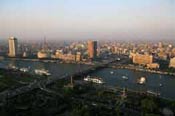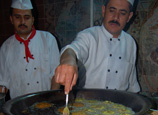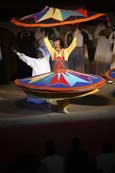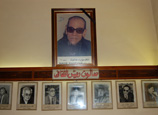|
 Since
the end of the
nineteenth
century, Egypt
has been
evolving at a
very high speed.
Its political,
economical and
cultural life
has undergone
striking
changes. From
the inscription
of the first
hieroglyph to
the construction
of the new
hi-tech Smart
Village, Egypt
has always been
a pioneer on the
frontier for
emerging
information
technologies in
the Arab world. Since
the end of the
nineteenth
century, Egypt
has been
evolving at a
very high speed.
Its political,
economical and
cultural life
has undergone
striking
changes. From
the inscription
of the first
hieroglyph to
the construction
of the new
hi-tech Smart
Village, Egypt
has always been
a pioneer on the
frontier for
emerging
information
technologies in
the Arab world.
As well as
virtual
highways,
Egypt's roads,
railways and
waterways form a
21,000 mile
network from
Alexandria to
Aswan. They
include the
world famous
Suez Canal and
1,000 miles of
subsidiary
canals branching
between the Nile
and the sea.
POPULATION
With 72,000,000
inhabitants,
Egypt represents
one quarter of
the population
of the Arab
world. The city
of Cairo itself
counts about
16,000,000
people.
The Egyptian
population is
composed of
people from
various origins.
Most Egyptians
originate from
Ancient Egypt
and the Nile
Valley. Others
come from the
Arabic and
Levantine
descents and the
Nubians of Upper
Egypt
CUISINE
Although some
dishes are
similar to
Middle East
Cuisine, Egypt
is famous for
its typical,
local
specialities
such as "Foul"
(Egyptian dry
beans), "Molokhia"
(a soup made of
molokhia leaves
and chicken), or
"Mahshi" (an
assortment of
different
vegetables
usually stuffed
with rice and
minced meat).
MUSIC AND
DANCE
 From
Om Kalthoum to
pop, from the
Cairo Ballet to
folk festivals,
music and dance
remain very much
present in the
Egyptian soul
and can be found
throughout the
country - in the
cities, towns
and villages and
even on the Nile
cruise boats. From
Om Kalthoum to
pop, from the
Cairo Ballet to
folk festivals,
music and dance
remain very much
present in the
Egyptian soul
and can be found
throughout the
country - in the
cities, towns
and villages and
even on the Nile
cruise boats.
Music can be
heard anywhere
in Egypt.
Classical Arabic
music was
represented by
Om Kalthoum, the
most famous Arab
singer of the
twentieth
century. Her
long poems were
the expression
of Arab
identity.
Despite her
death in 1975,
her presence is
still strongly
felt in the
media. She is
most probably
the only artist
in history to
have an entire
radio station
dedicated
exclusively to
her music.
Pop music is
very popular as
the average
population age
has decreased.
Egypt also
provides the
best backing
musicians,
songwriters,
production
facilities and
the biggest
audiences in the
Arab world.
Egypt is the
only country in
the Middle East
with a
residential
classical ballet
company - the
Cairo Ballet.
Almost forty
years ago, the
Ministry of
Culture invited
Russian masters
to train a new
pool of native
ballerinas and
dancers. Today,
the Cairo Ballet
boasts 150
full-time
students, and is
gaining
international
plaudits for
their
progressive and
inspiring work.
Belly-dancing
also gained
credibility with
the advent of
cinema. It is
still quite
popular
nowadays.
Sufi dancing is
more about
spirituality and
there's a Sufi
troupe that
performs
regularly in
Islamic Cairo.
THEATER
Theatre was at
the heart of
Egyptian culture
long before the
Greeks arrived
and built their
classical
auditoriums,
including the
theatre seating
10,000
spectators at
Oxyrhynchos.
Nowadays, both
classical and
modern theatre,
from the
mainstream to
the experimental
edge, is
celebrated
through
international
festivals. The
highlight climax
of the dramatic
calendar is
Cairo's
International
Experimental
Theatre
Festival,
bringing
playwrights and
performers from
over 46
countries
together.
Egypt was the
first country in
the Middle East
and in Africa to
have an Opera
House. The first
Opera House was
built in Egypt
in 1869, with
room for 2,000
opera lovers in
its three
theatres as well
as a museum, an
art gallery and
a music library.
It is one of the
Middle East's
premier cultural
venues.
LITERATURE
With a Nobel
Prize for
literature in
1988, Naguib
Mahfouz shaped
the nature of
Arabic l iterature
in the twentieth
century with his
masterpiece "The
Cairo Trilogy". iterature
in the twentieth
century with his
masterpiece "The
Cairo Trilogy".
Egypt's women
writers such as
Nawal al-Saadawi,
author of "Woman
at Point Zero",
or Ahdaf Soueif,
author of "The
Map of Love",
are enjoying
more
international
success than the
men.
Some famous
western novels
of Egypt are
worth reading to
feel the
atmosphere of
the country :
"The Alexandria
Quartet" by
Lawrence Durrell,
"City of Gold"
by Len Deighton
(based on solid
research on
Cairo) or "The
Photographer's
Wife" by Robert
Sole (for
details on
nineteenth
century Egypt).
|